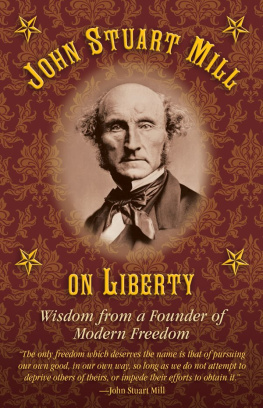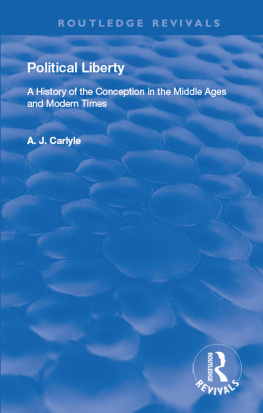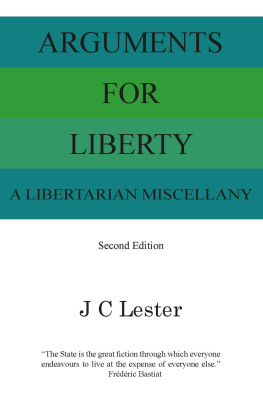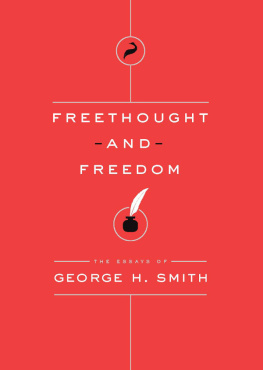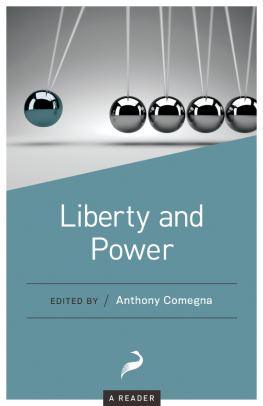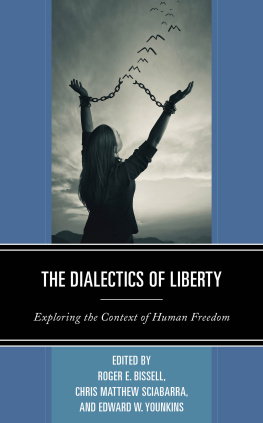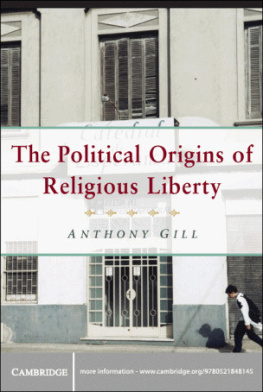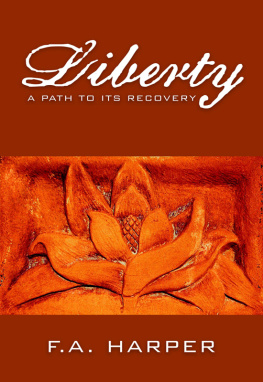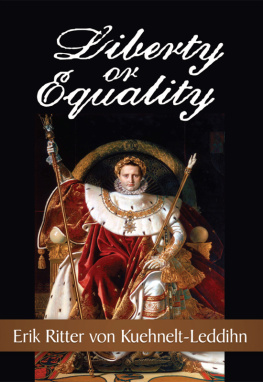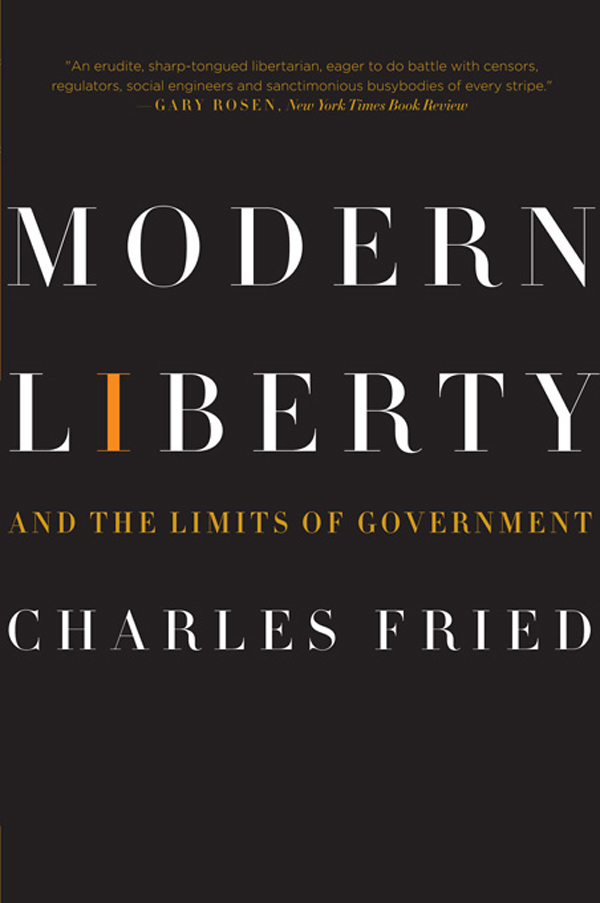
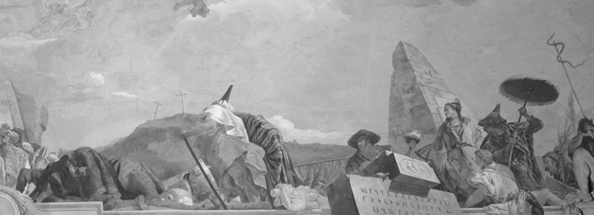
MODERN LIBERTY
and the limits of government
Charles Fried

W. W. NORTON & COMPANY
NEW YORK LONDON
Copyright 2007 by Charles Fried
All rights reserved
Printed in the United States of America
First Edition
Interior art: Details from a fresco by Ambrogio Lorenzetti
(fl. c. 13111348). Allegory of Good Government: Effects of Good Government
in the City, 13381339. Palazzo Pubblico, Siena, Italy.
Photograph credit: Scala / Art Resource, NY.
Ebook conversion by Erin Schultz, TIPS Publishing, Inc.
For information about permission to reproduce selections from this book,
write to Permissions, W. W. Norton & Company, Inc., New York, NY 10110
Manufacturing by Courier Westford
Library of Congress Cataloging-in-Publication Data
Fried, Charles, 1935
Modern liberty : and the limits of government / Charles Fried. 1st ed.
p. cm.
Includes bibliographical references and index.
ISBN-13: 978-0-393-06000-3 (hardcover)
ISBN-10: 0-393-06000-4 (hardcover)
1. Liberty. 2. State, The. I. Title.
JC585.F7575 2006
323.44dc22
2006022060
W. W. Norton & Company, Inc., 500 Fifth Avenue, New York, N.Y. 10110
www.wwnorton.com
W. W. Norton & Company Ltd., Castle House, 75/76 Wells Street,
London W1T 3QT
1 2 3 4 5 6 7 8 9 0
Also by Charles Fried
An Anatomy of Value
Medical Experimentation: Personal Integrity and Social Policy
Right and Wrong
Contract as Promise
Order and Law: Arguing the Reagan Revolution
Making Tort Law (with David Rosenberg)
Saying What the Law Is: The Constitution in the Supreme Court
Issues of Our Time
Ours has been called an information age, but, though information has never been more plentiful, ideas are what shape and reshape our world. Issues of Our Time is a series of books in which some of todays leading thinkers explore ideas that matter in the new millennium.The authorsbeginning with the philosopher Kwame Anthony Appiah, the lawyer and legal scholar Alan Dershowitz, and the Nobel Prizewinning economist Amartya Senhonor clarity without shying away from complexity; these books are both genuinely engaged and genuinely engaging. Each recognizes the importance not just of our values but also of the way we resolve the conflicts among those values. Law, justice, identity, morality, and freedom: concepts such as these are at once abstract and utterly close to home. Our understanding of them helps define who we are and who we hope to be; we are made by what we make of them. These are books, accordingly, that invite the reader to reexamine hand-me-down assumptions and to grapple with powerful trends. Whether you are moved to reason together with these authors, or to argue with them, they are sure to leave your views tested, if not changed. The perspectives of the authors in this series are diverse, the voices are distinctive, the issues are vital.
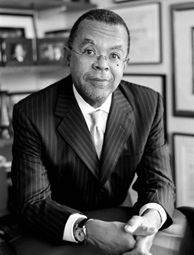
Henry Louis Gates Jr., series editor
W. E. B. Du Bois Professor of the Humanities
Harvard University

Issues of Our Time
Other titles
KWAME ANTHONY APPIAH
Cosmopolitanism: Ethics in a World of Strangers
AMARTYA SEN
Identity and Violence: The Illusion of Destiny
ALAN DERSHOWITZ
Preemption: A Knife That Cuts Both Ways
Forthcoming authors
WILLIAM JULIUS WILSON
LOUIS MENAND
CLAUDE STEELE
AMY GUTMANN
NICK LEMANN
ROLAND FRYER
Dedication:
For my friends
Ronald Dworkin and Thomas Nagel
and in memory of
Robert Nozick and John Rawls
from whom I have learned so much
Contents
PREFACE
Individual liberty in the welfare administrative state, the modernliberty of my title, has been on my mind at least since the 1960s. It is what I talked about with the four friends to whom I dedicate this book. Liberty has been implicated in one way or another in all my writing and teachingon public and private law and on philosophyand in my work in government. When Henry Louis Gates, Jr., the general editor of this series, asked me to contribute a volume on free speech, I declined, because I had just published a book on constitutional law, Saying What the Law Is: The Constitution in the Supreme Court, in which free speech is a principal topic. I proposed instead to broaden my horizon to liberty in general and to do it in a different way. My aspiration was to do for our time and liberal democratic societies what Friedrich Hayek did for his some sixty years ago in The Road to Serfdom, but without the apocalyptic thunder, with full acknowledgment of the good things that the postNew Deal world has done for almost everyone.
The challenge from the start has been to write a book that, while closely and fairly argued, at the same time is concrete, immediate, and personal, assuming no particular disciplinary background nor deploying any technical machinerywhat my friend 11 Bruce Ackerman calls a book not for lawyers or academics but for human beings. In this I have been lucky in my editors: Roby Harrington, who kept that conception firmly before me, and Robert Weil, whose detailed, hectoring, appreciative, enthusiastic suggestions are rarely encountered in the publishing trade these days. Bruce Ackerman, Anthony Appiah, Stephen Breyer, Alan Dershowitz, Philip Fisher, Stephen Greenblatt, Janet Halley, Daryl Levinson, Richard Posner, Alan Stone, and William Stuntz have read drafts of all or part of the book at various stages and have given me much help and encouragement along the way. I thank them for their help, support, and friendship. I had valuable research and editorial help from my students Daniel Kelly, Tian Tian Mayimin, and especially Scott Dasovich.
Charles Fried
Cambridge, Massachusetts
March 2006
CHAPTER 1
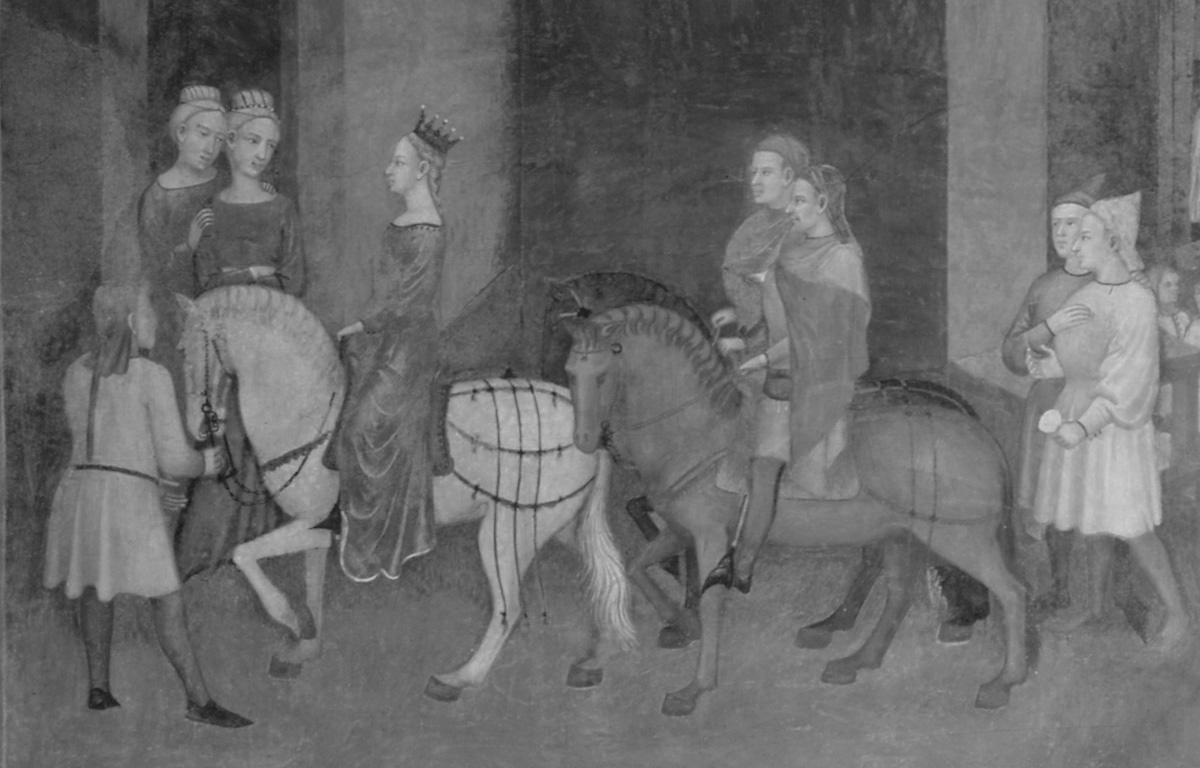
LIBERTY: THE VERY IDEA
As a great popular leader [Mussolini] has said to an applauding multitude, We will trample upon the decomposing body of the Goddess of Liberty.
W. B. Yeats, Irish Independen t, August 4, 1924
He [labb de Mably] hated individual liberty as one hates a personal enemy.
Benjamin Constant
For Benjamin Constantsometimes called the rst apostle of modern libertyindividual liberty is the rst need of modern man.is the closest thing to that ideal.
That is what I grew up to believe. My family and I were chased from Praguethat most prosperous, most commercial, most comfortable, bourgeois, and civilized of citiesby a homicidal maniac who, like Robespierre and Napoleon, had a vision of the glory of a nation and a people but cared nothing at all about persons. Then, with Hitler gone and my father on the point of taking us back to Czechoslovakia, that country was put in the pocket of another mass murderer with an even more lethalbecause more plausible nightmare vision, that of a universal equality, in which every man would belong to everyone and all men belong to the state.
Next page

